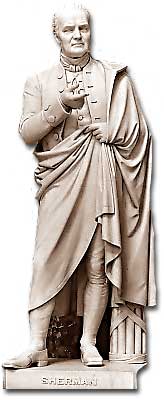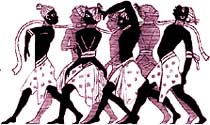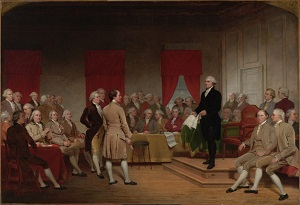15d. Constitution Through Compromise

Roger Sherman was the only man to sign all 4 of the important Revolutionary documents: The Association of 1774, the Declaration of Independence, the Articles of Confederation, and the Constitution.
"Representation" remained the core issue for the Philadelphia Convention. What was the best way for authority to be delegated from the people and the states to a strengthened central government?
After still more deeply divided argument, a proposal put forward by delegates from Connecticut (a small population state ), struck a compromise that narrowly got approved. They suggested that representatives in each house of the proposed bicameral legislature be selected through different means. The upper house (or Senate) would reflect the importance of state sovereignty by including two people from each state regardless of size. Meanwhile, the lower house (the House of Representatives) would have different numbers of representatives from each state determined by population. Representation would be adjusted every ten years through a federal census that counted every person in the country.
By coming up with a mixed solution that balanced state sovereignty and popular sovereignty tied to actual population, the Constitution was forged through what is known as the Connecticut Compromise. In many respects this compromise reflected a victory for small states, but compared with their dominance in the Congress under the Articles of Confederation it is clear that negotiation produced something that both small and large states wanted.
Other major issues still needed to be resolved, however, and, once again, compromise was required on all sides. One of the major issues concerned elections themselves. Who would be allowed to vote? The different state constitutions had created different rules about how much property was required for white men to vote. The delegates needed to figure out a solution that could satisfy people with many different ideas about who could have the franchise (that is, who could be a voter).
For the popular lower house, any white man who paid taxes could vote. Thus, even those without property, could vote for who would represent them in the House of Representatives. This expanded the franchise in some states. To balance this opening, the two Senators in the upper house of the national government would be elected by the state legislatures. Finally, the President (that is, the executive branch) would be elected at the state level through an electoral college whose numbers reflected representation in the legislature.
To modern eyes, the most stunning and disturbing constitutional compromise by the delegates was over the issue of slavery. Some delegates considered slavery an evil institution and George Mason of Virginia even suggested that the trans-Atlantic slave trade be made illegal by the new national rules. Delegates from South Carolina and Georgia where slavery was expanding rapidly in the late-18th century angrily opposed this limitation. If any limitations to slavery were proposed in the national framework, then they would leave the convention and oppose its proposed new plan for a stronger central government. Their fierce opposition allowed no room for compromise and as a result the issue of slavery was treated as a narrowly political, rather than a moral, question.
The delegates agreed that a strengthened union of the states was more important than the Revolutionary ideal of equality. This was a pragmatic, as well as a tragic, constitutional compromise, since it may have been possible (as suggested by George Mason's comments) for the slave state of Virginia to accept some limitations on slavery at this point.

The slave trade was always a controversial issue in the history of the United States.
The proposed constitution actually strengthened the power of slave states in several important respects. Through the "fugitive clause," for example, governments of free states were required to help recapture runaway slaves who had escaped their masters' states. Equally disturbing was the "three-fifths formula" established for determining representation in the lower house of the legislature. Slave states wanted to have additional political power based on the number of human beings that they held as slaves. Delegates from free states wouldn't allow such a blatant manipulation of political principles, but the inhumane compromise that resulted meant counting enslaved persons as three-fifths of a free person for the sake of calculating the number of people a state could elect to the House of Representatives.
After hot summer months of difficult debate in Philadelphia from May to September 1787, the delegates had fashioned new rules for a stronger central government that extended national power well beyond the scope of the Articles of Confederation. The Constitution created a national legislature that could pass the supreme law of the land, could raise taxes, and with greater control over commerce. The proposed rules also would restrict state actions, especially in regard to passing pro-debtor laws. At the end of the long process of creating the new plan, thirty-eight of the remaining forty-one delegates showed their support by signing the proposed Constitution. This small group of national superstars had created a major new framework through hard work and compromise.
Now another challenge lay ahead. Could they convince the people in the states that this new plan was worth accepting?







